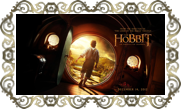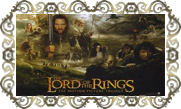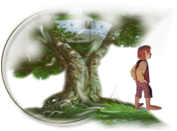

| When I first saw the announcement of the book Of Words and Worlds: The Imagination and Subcreation of J.R.R. Tolkien I immediately tried to obtain some more information. I knew the Leaders in Action series by Cumberland House Publishing, since they had published a book on C.S. Lewis called Not a Tame Lion: The Spiritual Legacy of C.S. Lewis written by Terry W. Glaspey and George Grant in 1996. To my surprise the author of this soon to be published book on Tolkien had written works with titles like The Video Game Theory Reader (Routledge, 2003), Virtual Morality: Morals, Ethics, and New Media (Peter Lang, 2003), The Medium of the Video Game (2001). Logically I was interested to know how he got into writing a book on J.R.R. Tolkien and what it was all about. I'm honored to post the following interview. |
Interview with the author Dr. Mark J. P. Wolf:
| To begin with I think it is important to establish a little about your background – so can you tell us a little about yourself?MJPW: I’m an Associate Professor in the Communication Department of Concordia University Wisconsin, and my Ph.D. is from the Cinema School at the University of Southern California. And from early on, Tolkien has been my favorite author. |
How did you get interested in Professor Tolkien's works?
MJPW: I’ve been interested in Tolkien’s work since I read his books in grade school, and of course I’ve reread them since. Growing up in South Milwaukee, I was also delighted to find out that Tolkien’s original manuscripts were housed only a few miles away at Marquette University. They’ve also hosted a number of Tolkien conferences and events over the years, which I have been able to attend.
I'd like to talk about your book Of Words and Worlds: The Imagination and Subcreation of J. R. R. Tolkien. What prompted you to write the book?MJPW: A former colleague at Concordia, Dr. Gene Edward Veith, recommended me to Cumberland Press, and they asked me to do the Tolkien Book for their “Leaders in Action” book series. I was honored to be asked, and accepted. I must admit that the prospect of doing a book on Tolkien was a bit daunting, considering all the books that are already out there, but this was to be more of an introductory book, as it was part of the series, so that made it a little less intimidating.
You are best known for your many scholarly publications in the area of video games, ethics, and new media. How does this connect to Tolkien?MJPW: There is a connection. When I look back on the wide range of things I’ve been interested in, there is a convergence that brings many of them together; literature, film, animation, video games, and other media all have to do with the creation (or sub-creation, as Tolkien called it, to distinguish what human beings make from God’s ex nihilo creation) of imaginary worlds. This is reflected in a book project that I am working on, tentatively entitled Subcreation: Building Imaginary Worlds, which will look at the history of subcreation and the theory behind it, and how imaginary worlds differ from other media productions.
In the description by the publisher I read the book focuses specifically on how his imagination and his imaginary world (which he called his subcreation) relates to his life, works, and faith. Will this be an academic explanation? What can we expect?MJPW: While the focus of the book was left up to me, the series editor said that all the books were divided into three sections: the Life of the subject, the Thought of the subject, and the subject’s Legacy. So it was a matter of dividing each of these up into chapters, summarizing them, and then looking at how each might have related to his imaginary worldmaking. The press did ask the book to be written for a more general readership, so it was not as scholarly as some of my other writings, but it isn’t dumbed down either. The book is not presenting any never-seen-before archival material on Tolkien, or anything like that, so people with a background in Tolkien scholarship will no doubt have seen much of the material already. The book is more for a general readership that may have read Tolkien’s books but is less familiar with his background and thought. Hopefully, the focus on his imagination will give the book a slightly different angle, but I’m not the first person to write about that either.
What resources did you use to find the relations between his imaginary world and his life, works and faith?MJPW: Much of it was Tolkien’s own writings, of course, particularly his letters where he was more direct in talking about his faith, various beliefs, and his outlook on so many areas of life. Like Tolkien, I am a devout Roman Catholic and can identify with a lot of what he says regarding his faith and religion. With the same background, it also makes it a bit easier to see some of the influence of it in his works. Beyond Tolkien’s own works, there’s Humphrey Carpenter’s biography and his book on the Inklings, and other reference works and so forth covering every aspect of Tolkien’s life, from a variety of perspectives.
What was the effect of Tolkien’s books on the whole fantasy genre? MJPW: It made it into one of the most popular genres of fiction today, inspiring generations of authors (including myself; I have a fantasy novel and a sci-fi novel for which I am currently looking for an agent and publisher). To some degree, it kind of solidified the genre as well, bringing together heroic fiction, fairy tales, and the kinds of fantasy produced before Tolkien, like Eddison and Morris, and made it into a single, commercial, marketable genre. Of course, unlike so many of the novels in the genre, Tolkien’s work is literary, and transcends the genre that it inspired.
Will you also discuss the influence Tolkien had on the gaming industry, or better, the creation of his Middle-earth?MJPW: It’s covered to some degree in the “Legacy” section, though the book’s chapters are all relatively short, as the book itself is. Hopefully readers will find their appetites whetted and afterward go in search of more in-depth books, like Christopher Tolkien’s History of Middle-earth series, which you just can’t beat when it come to looking at the creation of Middle-earth.
Do you think the area of video games, new media and movies would have been different if Tolkien had not published The Lord of the Rings?MJPW: It might have taken longer to reach the current stage at which so much of what is produced today is franchise-based. Certainly there were franchises before Tolkien, like Baum’s Oz books, but franchising really took off in the fantasy and sci-fi genres, where one still finds most of it. Video games came about just around the time franchising was taking off, and they soon became another outlet for franchises to use.
Where would you place your book? Is it a scholarly publication or will it also be an easy reader?MJPW: At the publisher’s and series editor’s request, it is more for a general readership. But as I said earlier, it’s not dumbed down, and it is still probably a bit more scholarly than more “fannish” kinds of things, and it does introduce many ideas and themes that are taken up in greater depth and detail in other Tolkien-related books.
What challenges and other interesting moments did you have researching Tolkien's subcreation and imagination?MJPW: Well, Tolkien himself was apparently not fond of people who wanted to know about the details of the author’s personal life, though this attitude is more common now than it was in Tolkien’s day. The size and scope of his imagination and subcreation also provide a challenge; there’s a lot to keep in mind at once, especially when looking at his world and all of its characters, histories, languages, events, and so on. As the History of Middle-earth series shows, it was even a challenge for Tolkien himself to keep it all straight and work out any conflicts or contradictions. Interesting moments would have to include reading his letters and finding interesting or revealing comments that give one insight into his creative processes and what he thought of his work. For example, in one letter written while he was still writing The Lord of the Rings, he wondered whether what he was doing would end up being just a “fruitless private hobby”. It amazes me that he had no idea that his work would be as well received as it was. And as someone who writes fiction myself, I also find that very encouraging.
What was / is your hope for your readers?MJPW: That they’ll buy the book. But, seriously… the book’s main goal is the presentation of a wide range of aspects of Tolkien’s life, which should lead to a greater appreciation of his work, and hopefully to a further interest in what he has written and what has been written about him. If the book serves to interest general readers and point them towards a greater interest in Tolkien and his works, then it will have succeeded.
Your book is part of the ‘Leaders in Action’ series. Does Tolkien fit in this series where he is placed between persons like George Washington, Theodore Roosevelt, Johann Sebastian Bach, and Martin Luther?MJPW: There seems to have been two criteria that were used to choose the subjects of the series: that they were Christians, and leaders in their chosen fields. And Tolkien was certainly both of these. In most of the cases, the subject’s Christianity can be seen in their leadership, and actively influences it, which is also true of Tolkien. Most people know Tolkien as a leader in the fantasy genre, but this came relatively late in his life. He was also a renown philologist, and his essay on Beowulf is considered to be one of the best works on the subject. I don’t know that Tolkien would have necessarily thought of himself as a “leader” as such, but a person doesn’t have to consider themselves one to be one.
Can you tell us a little about your major project Subcreation: Building Imaginary Worlds?MJPW: It will be the first book-length and in-depth look at the largest of media entities, the subcreated world. I think it’s currently been overlooked in media studies because most approaches are either media-based, looking at film, or TV, or video ganes, etc., individually, or narrative-based, where individual stories are examined, rather than world-based, where the world is treated as a single entity, even though multiple stories occur in it, and it is seen through a variety of different media windows. I’m interested in the worlds themselves as objects of study. So apart from defining what subcreated worlds are and how they differ from other things, I’ll be looking at the their development through history, and the structures from which they are made, how they grow, and how this affects the stories told within them, as well as how they operate as franchises. It’ll take awhile to do, because studying subcreated worlds can be a daunting task; whereas one can see a film in a few hours or read a novel in a few days, some subcreated worlds can be made up of dozens of novels, movies, TV series, video games, and so on, and they’re ongoing, growing things, so that it’s pretty hard to say you have seen and heard everything there is to see and hear about them. So they’re more time-consuming and more difficult to study than other media productions, which could also account for why they are often overlooked. So in a sense, a lot of the media I have enjoyed over the years have been research in this direction, though I didn’t know it at the time.
On final question: What is your opinion of the Hobbit movie?
MJPW: It’s a shame that it took so long to work everything out so that the movie could be made. But I think both sides want it made, and certainly the audience does. So they’ll probably be made, if all the legalities can be worked out and agreements can be reached. Considering what they’d lose if they didn’t, I’m guessing it’ll probably work out in the end.
Information about the book:
| Of Words and Worlds: The Imagination and Subcreation of J.R.R. Tolkien provides an introduction to Tolkien's life, thought, and legacy that focuses specifically on how his imagination and his imaginary world (which he called his subcreation) relates to his life, works, and faith. In it Mark J. Wolf examines numerous themes in Tolkien's work as well as the works themselves: The Hobbit, The Lord of the Rings, The Silmarillion, his shorter fiction, his drawings, and his scholarly writings. The last section of the book looks at Tolkien's lasting legacy, including the fantasy genre that he revived almost single-handedly. Dozens of writers, designers, and filmmakers have been inspired by Tolkien, and his ideas concerning highly detailed and internally consistent imaginary worlds and their making are an inspiration to many. | ||
| Of Words and Worlds: The Imagination and Subcreation of J. R. R. Tolkien Publisher: Cumberland House PublishingAuthor: Dr. Mark J. P. Wolf Series: Leaders In Action Publication Date: May 1, 2008 Type: HardcoverEstimate: 256 pages ISBN-10: 1581826427ISBN-13: 978-1581826425 | ||
Spread the news about this J.R.R. Tolkien article:
Read more http://goo.gl/DuC9WZ














